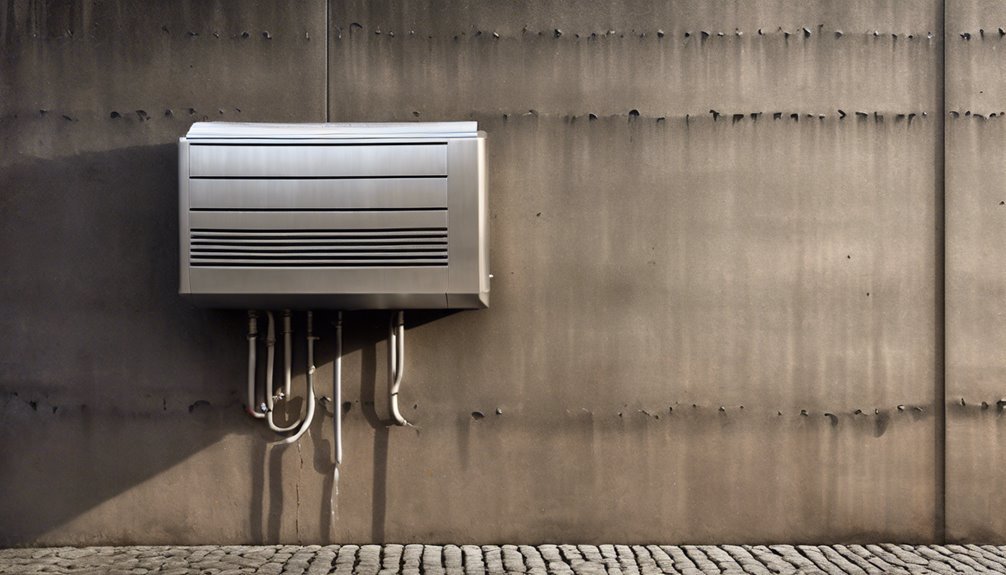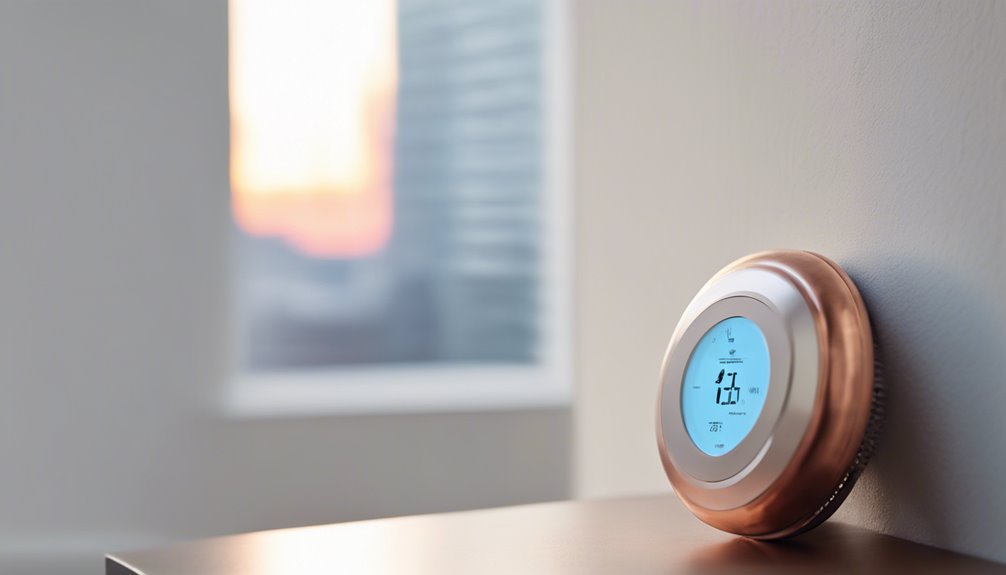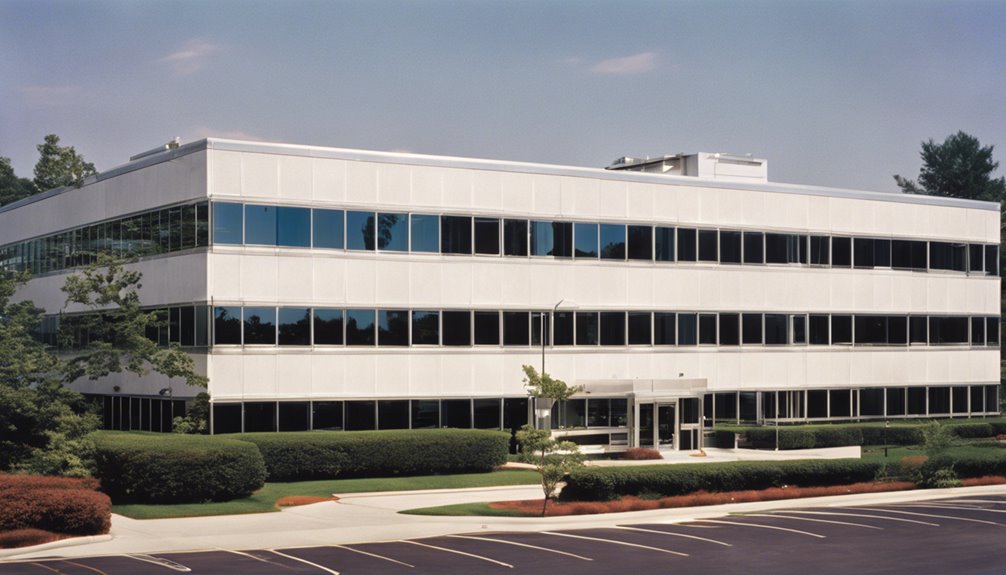When you notice your air conditioner leaking water outside, it's not always a cause for concern, but it's still important to investigate. Normal condensation can occur, especially in humid areas, producing 5-20 gallons of water daily. However, if you see water pooling around the unit, water stains on walls or ceilings, or rust on the exterior, it's a sign of excessive water leakage. You're on the right track by looking into this issue – now, let's get to the bottom of what's causing the leak and how to fix it.
Key Takeaways
- Air conditioners typically produce 5-20 gallons of condensate daily, but excessive water pooling around the unit indicates a leakage issue.
- Condensation is a normal process, especially in humid areas, but water stains on walls or ceilings suggest water seepage from the AC.
- Clogged air filters, refrigerant leaks, and drainage issues can cause water leaks, so regular maintenance is essential to prevent these problems.
- Incorrect installation and poor maintenance can lead to water leaks, so ensure the AC unit is installed correctly and regularly serviced.
- If you're unsure about the leak's source or how to fix it, it's best to call a professional to diagnose and repair the issue.
What Causes Condensation in Air Conditioners?
When you run your air conditioner, you might notice water droplets forming on the unit or even a puddle of water on the floor nearby.
This condensation is a normal process, especially in humid climates. As your AC cools the air, it also removes excess moisture, creating a dehumidifying effect.
As the hot air from outside passes over the cool coils, the water vapor in the air condenses into droplets. This process is more pronounced in areas with high humidity, where the air is already saturated with moisture.
Hot air meets cool coils, condensing water vapor into droplets, especially in humid areas where air is already saturated with moisture.
In these cases, your AC is essentially pulling excess water out of the air, resulting in the condensation you see.
How Much Water Is Too Much Water?
You've probably wondered if the water accumulation around your air conditioner is normal or a cause for concern.
The answer lies in understanding how much water is too much. A typical air conditioner produces around 5-20 gallons of condensate daily, depending on the evaporation rate, humidity, and water pressure.
If you notice more than 2-3 inches of water around the unit, it may indicate a problem. Check if the condensate drainage system is clogged or if the unit is installed at an incorrect angle, which can affect water pressure.
Keep in mind that some water accumulation is normal, but excessive water can lead to mold growth, rust, and electrical issues. Be aware of your AC's water output to prevent potential problems.
Signs of Excessive Water Leakage
Watch for these warning signs to determine if your air conditioner is leaking excessive water: water pooling around the unit, water stains on walls or ceilings, and rust or corrosion on the AC's exterior. These signs indicate that your AC is leaking more water than it should, which can lead to water damage and moisture issues.
| Warning Sign | Description | What It Means |
|---|---|---|
| Water Pooling | Water accumulating around the AC unit | Excessive water leakage |
| Water Stains | Discoloration on walls or ceilings | Water seepage from the AC |
| Rust or Corrosion | Visible rust or corrosion on the AC's exterior | Water damage and potential system failure |
If you notice any of these signs, it's essential to investigate and address the issue promptly to prevent further damage and costly repairs.
Clogged Air Filters and Water Leaks
A dirty air filter can be a silent culprit behind your AC's water leak. You mightn't think twice about it, but a clogged filter can cause your air conditioner to work harder, leading to increased condensation and, ultimately, water leakage.
Regular furnace maintenance, including checking and replacing air filters, can help prevent this issue. It's essential to invest in high-quality filters that can capture dirt and debris effectively.
Failing to do so can result in reduced airflow, increased energy bills, and yes, water leaks. By prioritizing filter quality and maintenance, you can minimize the risk of water leaks and keep your AC running smoothly.
Refrigerant Leaks and Water Damage
As refrigerant flows through your AC's coils, even the tiniest leak can cause significant water damage.
Refrigerant leaks can lead to water accumulation around your unit, and if left unchecked, can cause severe damage to your walls, floors, and ceilings.
Unchecked refrigerant leaks can cause devastating water damage to walls, floors, and ceilings.
To prevent this, you should schedule regular system inspections to detect refrigerant leaks early on. A professional technician will use specialized equipment for refrigerant detection, identifying even the smallest leaks.
During the inspection, they'll also check for other potential issues that could be contributing to water damage.
Drainage Issues and Water Accumulation
You're probably wondering why your AC is leaking water, and it's likely due to a drainage issue.
If you haven't checked your condensate drain lines recently, it's possible they're clogged, causing water to accumulate. Additionally, if your AC wasn't installed correctly, or if it's not sloped properly, that can also lead to water buildup.
Clogged Condensate Drain Lines
The condensate drain line is responsible for disposing of the condensed water vapor produced by your air conditioner.
If it gets clogged, water will accumulate and leak outside. You'll need to inspect the line to identify the blockage. Check for signs of algae or mold growth, which can restrict water flow.
You may need to perform drain pipe cleaning to remove debris or sediment that's built up over time. If you're not comfortable with this task, consider hiring a professional to do it for you.
Regular line inspection can help prevent clogs and ensure your AC operates efficiently. Don't ignore the issue, as it can lead to further damage and costly repairs.
Improper Installation or Slope
Your air conditioner's condensate drain line must be installed with a proper slope to ensure gravity assists in water flow. If the slope is incorrect, water won't drain, and you'll end up with a leak. Slope errors and installation flaws can cause water to accumulate, leading to damage and mold growth.
| Common Issues | Causes |
|---|---|
| Water pooling around the AC unit | Insufficient slope or incorrect installation |
| Water leaking from the condensate drain line | Blockages or kinks in the drain line |
| Corrosion or rust on the AC unit | Improper drainage leading to water accumulation |
| Mold or mildew growth | Water stagnation due to slope errors or installation flaws |
Ice Buildup and Water Leakage
When you notice your AC leaking water, it's likely that ice buildup is the culprit.
You'll typically find ice forming on the coils, which can be caused by a variety of factors, including refrigerant leaks, dirty air filters, and malfunctioning thermostats.
Causes of Ice Buildup
Clogged air filters can lead to ice buildup on your AC unit, causing water to leak out and creating a mess.
This happens when frost formation occurs due to restricted airflow, and moisture accumulation takes place. As a result, you'll notice water leaking from your AC.
- Dirty or clogged air filters: As mentioned, restricted airflow can lead to frost formation and moisture accumulation.
- Low refrigerant levels: Insufficient refrigerant can cause the AC's evaporator coils to freeze, resulting in ice buildup.
- Drainage issues: If the condensate drainage system is clogged, water can accumulate and freeze, leading to ice buildup.
Be sure to address these issues to prevent ice buildup and water leakage from your AC unit.
Ice Formation on Coils
The AC's evaporator coils are a prime spot for ice formation, which can lead to water leakage and a host of other issues. When you notice ice buildup on the coils, it's essential to address the problem promptly to prevent further damage. Frozen pipes can be a significant concern, as they can burst and cause extensive water damage.
| Issue | Causes | Solutions |
|---|---|---|
| Ice buildup | Dirty coils, low refrigerant | Coil inspection, cleaning, and refrigerant recharge |
| Water leakage | Clogged drainage, ice blockages | Clear drainage, defrost coils, and inspect for blockages |
| Reduced airflow | Dirty filters, coils | Clean or replace filters, and inspect coils for blockages |
| Increased energy bills | Inefficient system operation | Schedule regular maintenance, inspect for leaks, and optimize system performance |
Dirty Coils and Condensate Overflow
Since your AC is designed to remove heat from your home, it's no surprise that it produces condensate – a natural byproduct of cooling.
However, when your coils get dirty, it can lead to condensate overflow, causing water to leak outside your unit.
Dirty coils can cause condensate overflow, leading to water leaks outside your AC unit.
To prevent this, you should prioritize coil cleaning and maintenance.
- Efficient cooling: Dirty coils reduce your AC's ability to cool your home efficiently, leading to increased energy bills.
- Increased risk of water damage: Overflowing condensate can seep into your walls, floors, or ceilings, causing water damage and mold growth.
- Reduced lifespan: Neglecting coil maintenance can shorten your AC's lifespan, requiring costly repairs or even replacement.
Regular coil cleaning and maintenance can prevent these issues and ensure your AC runs smoothly.
Incorrect Installation and Water Leaks
You've addressed the issue of dirty coils, but another common culprit behind AC water leaks is incorrect installation.
A poorly installed AC unit can lead to water leaks due to poor craftsmanship, which includes incorrect fitting of components. If the condensate drainage system isn't properly connected, water can accumulate and eventually leak outside.
Additionally, a unit that's not level or securely fastened can cause the condensate pan to overflow, resulting in water leaks.
It's essential to ensure your AC unit is installed correctly to prevent water leaks and other issues. Check your unit's installation manual or consult with a professional if you're unsure about the installation process.
When to Call a Professional for AC Water Leaks
If your AC unit is leaking water, don't hesitate to call a professional if you're not comfortable troubleshooting or repairing the issue yourself.
It's better to be safe than sorry, as water leaks can lead to costly water damage and even require emergency services.
Here are some scenarios where you should definitely call a pro:
- You're unsure of the leak's source: If you can't pinpoint where the leak is coming from, it's best to leave it to a professional to diagnose and fix the issue.
- The leak is significant: If water is pouring out of your AC unit, you need emergency assistance to prevent further damage.
- You've tried DIY fixes without success: If you've attempted to fix the issue on your own without success, it's time to call in a professional to ensure the problem is resolved correctly.
Frequently Asked Questions
Can I Fix an AC Water Leak Myself?
You can try to fix an AC water leak yourself with a DIY toolkit, but first, you'll need to detect the source of the leak using leak detection methods, then decide if you're comfortable with the repair or if it's better left to a pro.
Will a Small Water Leak Harm My AC Unit?
You're wondering if a small water leak will harm your AC unit. Yes, it can cause water damage risk and compromise electrical safety, so don't ignore it – address the issue promptly to prevent further damage.
How Long Does It Take for Water Damage to Occur?
You're wondering how long it takes for water damage to occur. The answer depends on the water damage timeline, influenced by moisture accumulation rates. If you don't address the issue, you'll likely see damage within 24-48 hours, but it can take weeks or even months in some cases.
Can I Use a Dehumidifier to Reduce AC Condensation?
You can use a dehumidifier to reduce AC condensation, especially in a humid climate, by controlling condensation levels. By doing so, you'll minimize water accumulation, preventing damage and ensuring your AC operates efficiently and safely.
Will Turning off My AC Stop the Water Leak?
You're wondering if turning off your AC will stop the water leak. Yes, it's an immediate fix, but be cautious not to touch any wet parts to avoid electric shock.
Conclusion
So you've noticed your AC leaking water outside and you're wondering if it's normal. The truth is, some condensation is normal, but excessive water leakage is not. Check your air filters, refrigerant levels, and coils for any issues. If the problem persists, it may be due to incorrect installation or other underlying problems. Don't hesitate to call a professional if you're unsure – ignoring the issue can lead to costly water damage and other complications. It's better to address the problem now than to deal with it later.



